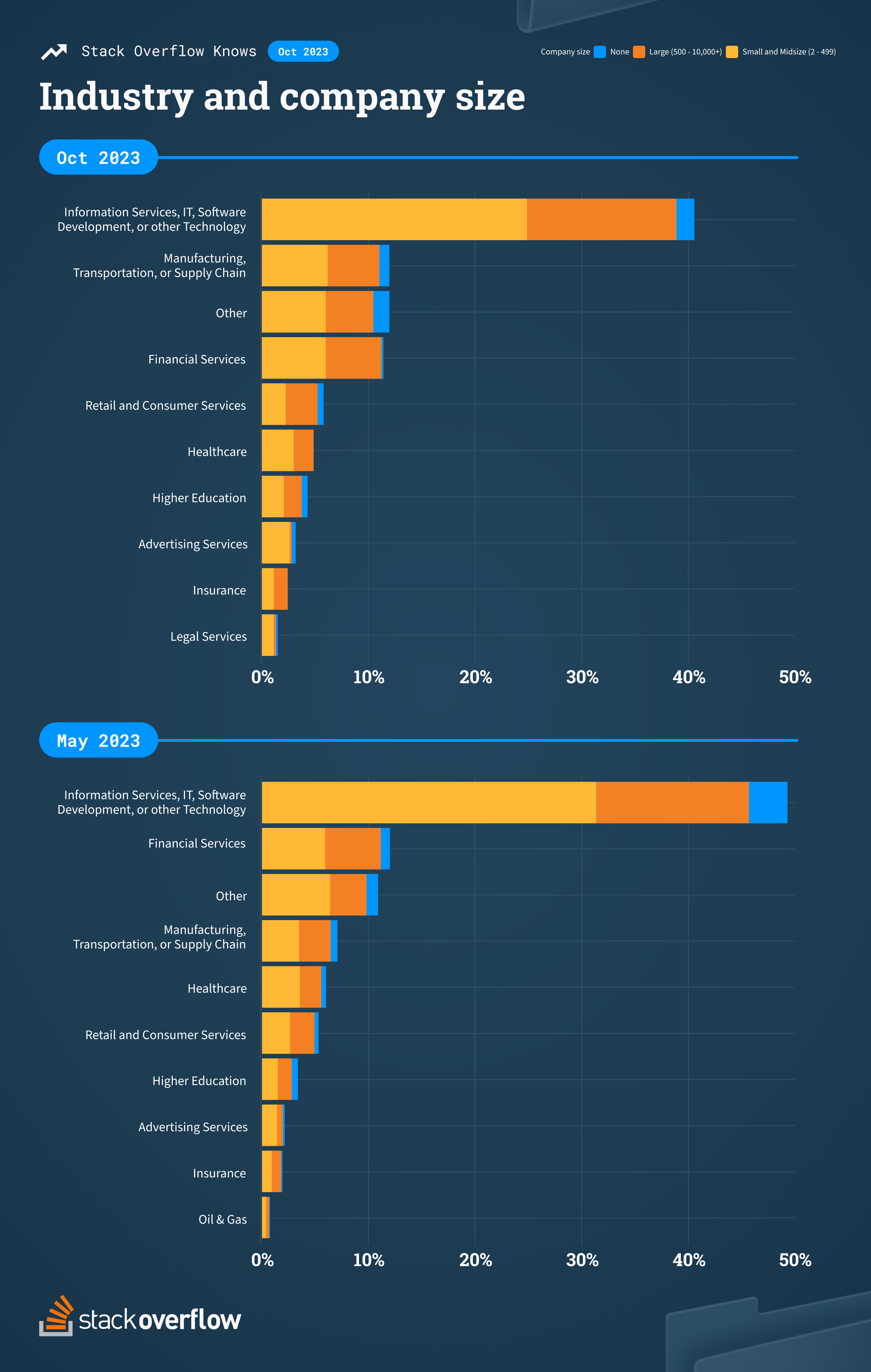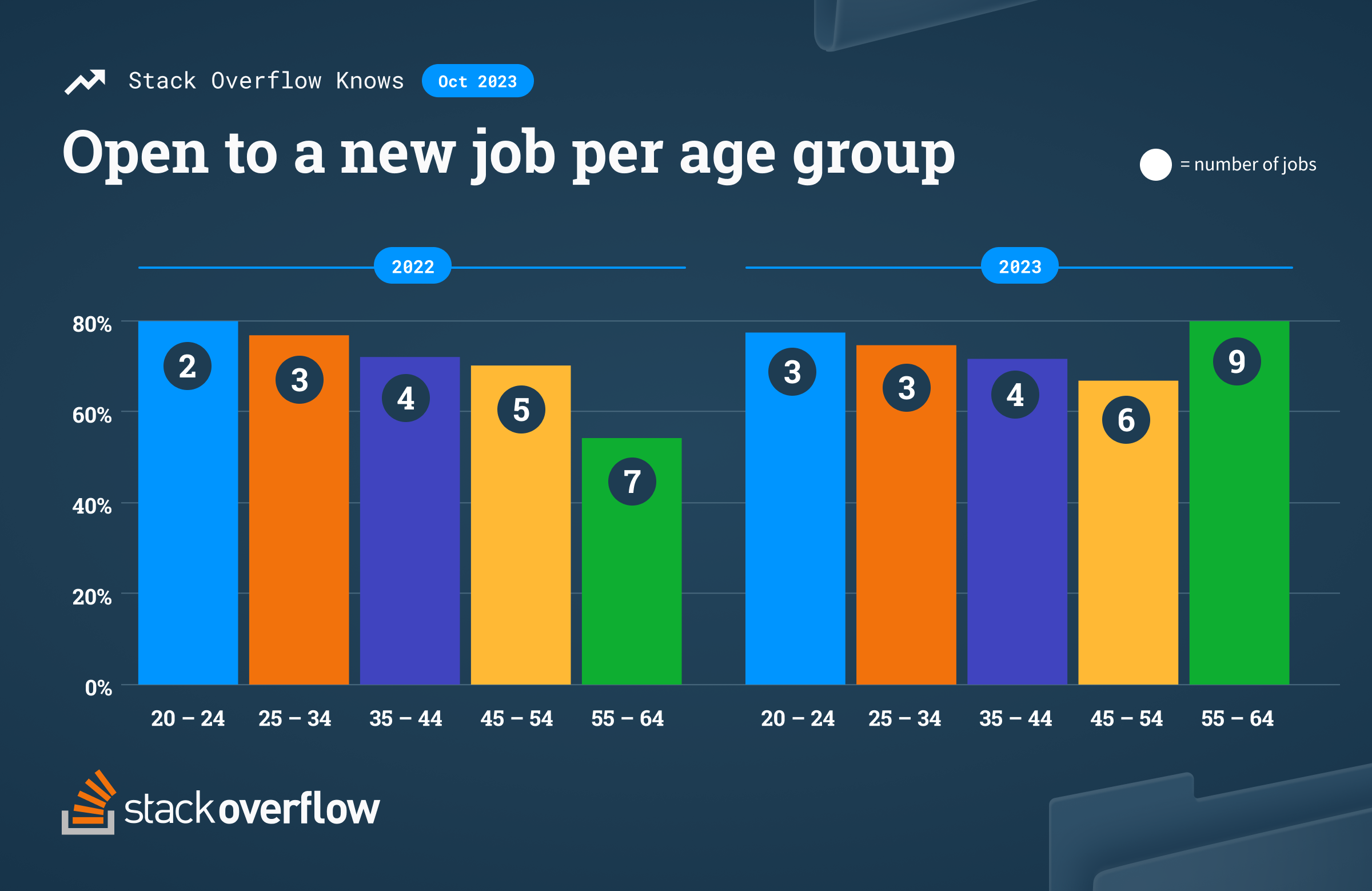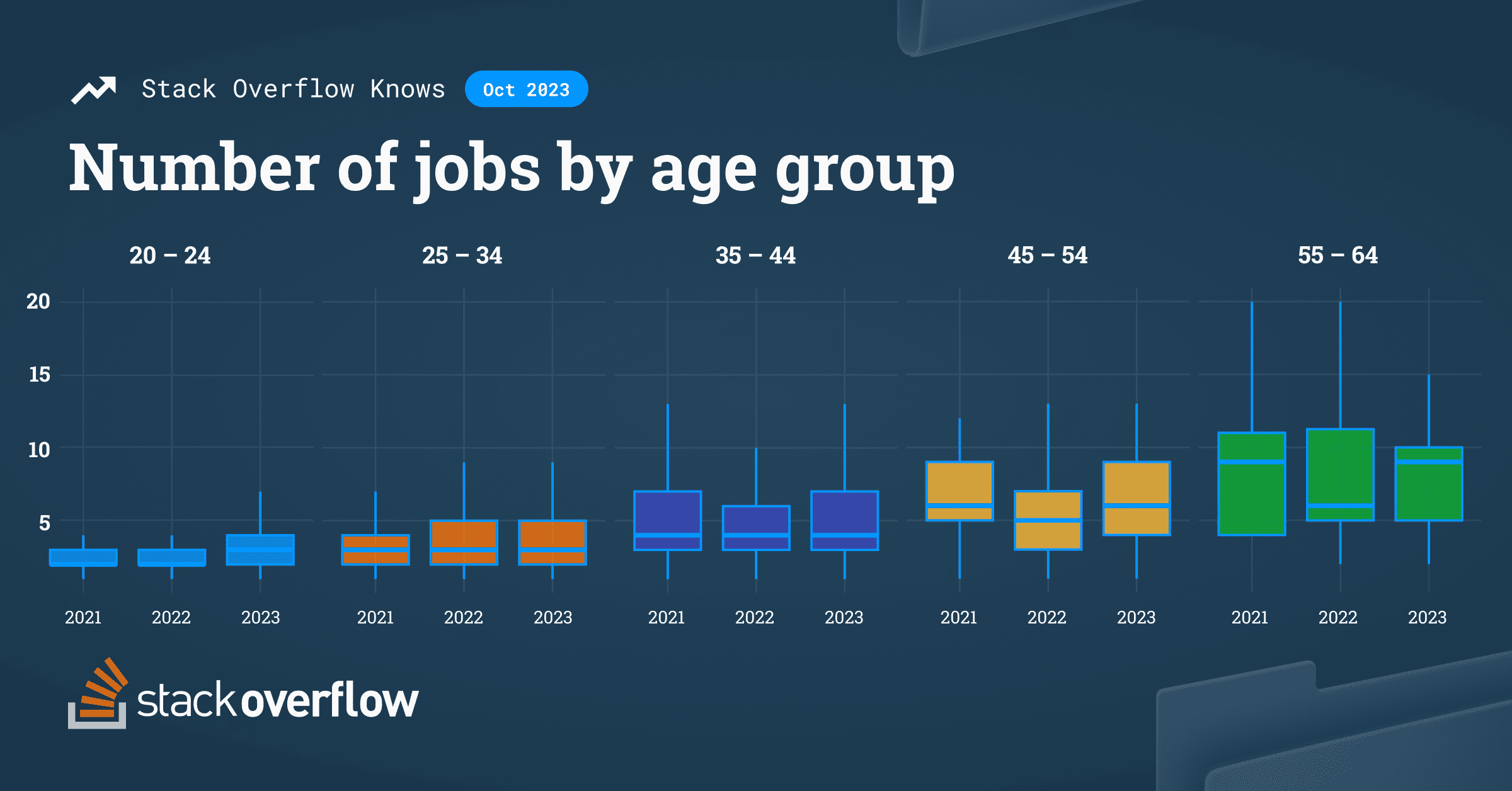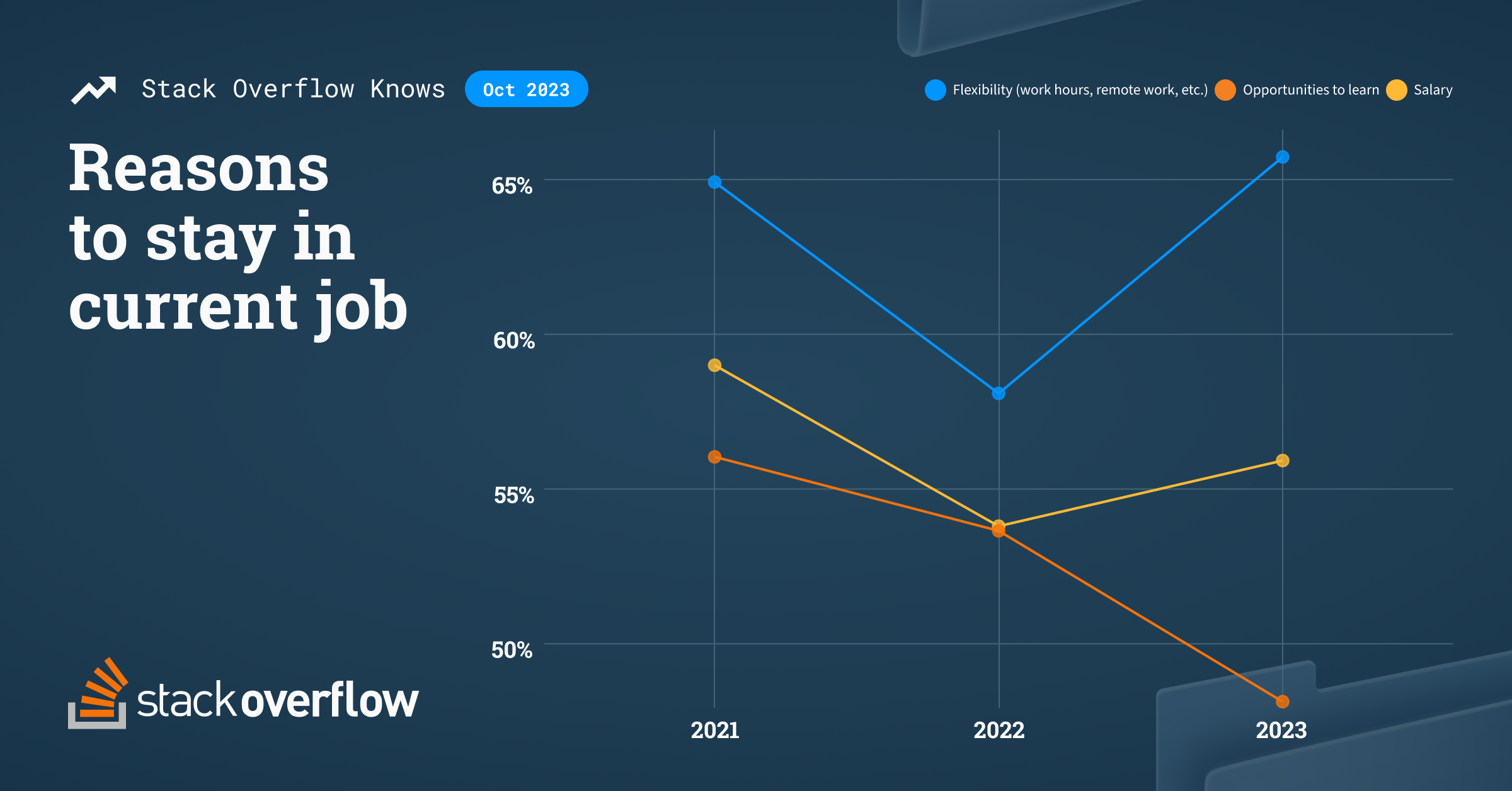More developers are looking for or are open to a new job now compared to the last two years—that’s according to the results of our latest survey on the state of developer employment. More than 1,000 developers responded to this year’s survey about jobs and 79% are at least considering new opportunities if not actively looking.
New insights from these survey results show that new tech talent and late-career developers are both more likely to be looking. New developers have increasingly switched jobs compared to early- and mid-career developers in the last three years. We believe that the decreasing amount of entry-level openings and lack of perceived stability within the tech industry, as described in a recent article by Wired, explain why these survey results show a migration of developers out of the tech industry and skilled developers exploring career changes out of curiosity. The trends around salary, flexibility, and learning indicate the current tech job market is like a gymnast’s balance beam routine for job-seekers who are seeking to compete and land the dismount as gracefully as possible.
Changing careers and changing industries
Every beam routine starts with a salute to the judge, and continuing this analogy for our survey results on job trends makes the global economy and countries it supports the proverbial judge. Developers from 107 different countries responded to our October pulse survey. Technology is the industry most developers currently work in (46%), followed by manufacturing/supply chain (14%) and financial services (13%). Developers reported working at a small or midsize company of less than 500 (56%) more often than a larger company of 500-10,000+ (38%). Compared to the 2023 Developer Survey, 8% of developers have exited the technology industry and are increasingly filling roles in manufacturing and supply chain companies (11% vs. 7%).

Developers report working for small and mid-size companies in the US and India slightly more than large companies and vice versa for developers in Germany and the UK. The US and Germany show the highest concentrations of manufacturing/supply chain developers and India shows the highest concentration of technology developers. The latest Developer Survey analysis pointed out that new tech talent and India’s tech sector revenue had been rapidly growing. India continues to have a concentration of developers in the technology industry and is positioned to take on more tech opportunities.
Developers are onboarding more in 2023
Developers, like gymnasts, must decide for themselves how many different poses or positions they want to fit in a limited amount of time (on the scoreboard or on a CV). Scoring well on the balance beam is a complex interplay of increasing the amount of skilled poses while risking a misstep or pause that detracts from the routine’s seamless appearance and final score. Developers of all age groups are hoping to segue into more positions in their routine. In other words, most are open to a new job.
Interest in looking for a new job drops as developers get older for new to mid-career (44 and younger) respondents (86% to 74%), but picks back up for those 55 to 64 (88%). Late-career developers acknowledge curiosity about other companies as their second top reason to look for a new job this year behind “better salary,” which all age groups rank as their top reason. Curiosity grew in importance for late-career developers since last year more than all other age groups (32% vs. 22%) and is more important to this group than reasons other groups ranked higher such as working with new technology and growth opportunities.
Curiosity is also driving developers to job boards before their job search is underway. Survey responses indicate the top two ways developers find out about companies they may want to work for before they start searching for a new job are on job boards (53%) or from their network (39%). Developers are not using company-owned media until their search has started and are most interested in educating themselves through company jobs pages (61%) followed by third-party review sites (52%). Later career developers’ experience and increase in curiosity could be driving the jump in median jobs held from seven to nine and being more interested in a new job this year compared to last year.

New tech talent, second to late-career developers amongst age groups most likely to be open to a new job, reported that they will have the same number of jobs in 2023 as early-career developers who are also looking for a new job. Job-hopping could change employer’s expectations for the workplace: new tech talent is onboarding at as many jobs by 24 as those up to 10 years their senior and this rapid experience cycle could rival the knowledge and experience of those they report to. Sentiment data from the survey hints at a reason to believe that knowledge-sharing will be a barrier as new tech talent moves into roles with more experience: 63% of new tech talent agrees or strongly agrees they are able to quickly find answers to their questions compared to 56% for more mature developers.

Respondents 20 - 44 usually report having fewer jobs compared to the median within their age group in years past, but the newest developers have moved from having fewer jobs to having as many jobs as early-career developers. When asked about what would cause them to leave their current positions, developers regardless of age cite salary and flexibility, in that order, as the top reasons for the last three years. Income and spending pressure could certainly be a reason to move to a new gig more recently, as another survey suggests salaries aren’t able to adequately keep up with inflation. Our survey reports salary is still important for new tech talent over the last three years as they job-hop, but consistent and not growing. For late-career developers, salary has increased in importance as a reason to leave and so has curiosity. Early- and mid-career developers have stayed consistent with their rankings of salary and flexibility in the same time period while job-hopping at a consistent pace.
Flexibility is in high demand while learning opportunities slumps
Artistry and craft on the balance beam is required to add a personal touch that shows the crowd something inventive but also spectacular, as learning to merely stay on the beam after a back handspring is not enough. This year, less developers indicated learning opportunities are an important factor to stay at their current job than the last two years. To continue this analogy, it’s as if 2023 developers have decided that just staying on the beam is enough. In 2021, 54% of developers said they stay in their current roles because of the learning opportunities, which decreased to 51% in 2022 and 44% this year.

Flexibility has remained the top reason to stay at a role all three years we have run this survey. Developers 44 and younger stand out in this trend as all identified the increased importance of flexibility; 70% of mid-career developers ranked it the most important reason to stay at their job compared to 65% for early-career developers and 59% for new tech talent.
A summary of a recent Gallup poll from The Economist posits that low levels of engagement at the workplace (not just for developers but all workers) is measurable and explains why workers are generally more interested in doing only what is necessary and not taking on opportunities to learn. In our 2023 Developer Survey, we started asking about AI and the sentiment around it in our developer community; results were very similar when we checked in again through this pulse survey (70% are using AI or planning to). Developers may also feel less enthusiastic about learning opportunities now that AI tools are rapidly developing to help many be more productive in their jobs (30% cite this as the top benefit).
The pressure to perform without missing the connection to the next big move, whether on a balance beam or job, all come back to a simple sentiment: flexibility is more important than ever. Maybe a tighter job market keeps comfortable developers where they are, while those who lack flexibility are more likely to look for it elsewhere. The migration of technology developers to other industries may be, as posited by Glassdoor, a reaction to the corporate culture of tech companies decreasing flexibility in order to justify higher pay. Respondents of this survey agree that they want higher pay—but not at the cost of their flexibility.